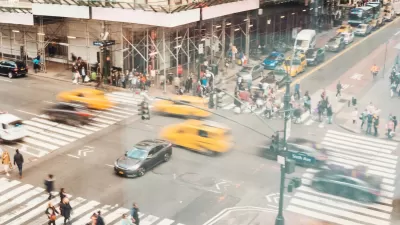A new study published in the American Journal of Epidemiology has linked an increase in the likelihood of being in a traffic fatality to a person's educational level.

Emily Badger and Christopher Ingram of The Washington Post report that despite improvements in safety features on newer vehicles, fatality rates for those 25 and older with less than a high school education continues to rise, contrary to the decrease in fatalities among those with more education.
"The underlying issue here is not that a college degree makes you a better driver. Rather, the least-educated tend to live with a lot of other conditions that can make getting around more dangerous. They own cars that are older and have lower crash-test ratings. Those with less education are also likely to earn less and to have the money for fancy safety features such as side airbags, automatic warnings and rear cameras."
Assumptions that the less educated are less likely to wear seat-belts or are more likely to have alcohol related accidents have proven false, for the most part. While seat-belt usage among the less-educated is less than other socio-economic groups, the report shows that usage has increased faster than other groups over time, narrowing the difference. Similarly, data related to the influence of alcohol in accidents "is also conflicting."
FULL STORY: The hidden inequality of who dies in car crashes

Alabama: Trump Terminates Settlements for Black Communities Harmed By Raw Sewage
Trump deemed the landmark civil rights agreement “illegal DEI and environmental justice policy.”

Planetizen Federal Action Tracker
A weekly monitor of how Trump’s orders and actions are impacting planners and planning in America.

The 120 Year Old Tiny Home Villages That Sheltered San Francisco’s Earthquake Refugees
More than a century ago, San Francisco mobilized to house thousands of residents displaced by the 1906 earthquake. Could their strategy offer a model for the present?

In Both Crashes and Crime, Public Transportation is Far Safer than Driving
Contrary to popular assumptions, public transportation has far lower crash and crime rates than automobile travel. For safer communities, improve and encourage transit travel.

Report: Zoning Reforms Should Complement Nashville’s Ambitious Transit Plan
Without reform, restrictive zoning codes will limit the impact of the city’s planned transit expansion and could exclude some of the residents who depend on transit the most.

Judge Orders Release of Frozen IRA, IIJA Funding
The decision is a victory for environmental groups who charged that freezing funds for critical infrastructure and disaster response programs caused “real and irreparable harm” to communities.
Urban Design for Planners 1: Software Tools
This six-course series explores essential urban design concepts using open source software and equips planners with the tools they need to participate fully in the urban design process.
Planning for Universal Design
Learn the tools for implementing Universal Design in planning regulations.
Clanton & Associates, Inc.
Jessamine County Fiscal Court
Institute for Housing and Urban Development Studies (IHS)
City of Grandview
Harvard GSD Executive Education
Toledo-Lucas County Plan Commissions
Salt Lake City
NYU Wagner Graduate School of Public Service





























